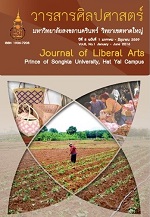Attitudes, Behaviors and Problems of English major students in using “Google Translate”
Keywords:
Google Translate, attitudes, behaviors, problems, English major studentsAbstract
This survey aimed to investigate attitudes, behaviors and problems in approaches to overcoming difficulties in using “Google Translate” (GT). One hundred and twenty three subjects were randomly selected from 2nd to 4th year students, majoring in English at the Faculty of Liberal Arts, Prince of Songkla University, Hat Yai Campus. A five-point Likert scale questionnaire was used to gather the data. The findings showed that 100 percent of the respondents knew and used GT mostly for educational purposes, focusing on searching for meanings at the word level rather than other meaning levels—sentence, paragraph or essay. Furthermore, they also reported three problems with GT use: 1) insufficient lexical data for translating, especially when Thai was the target language. 2) GT’s inability to precisely translate cultural differences, language structures and grammar 3) lexical aspect: word choices, word-for-word translation, translation flexibility and translation omission. Additionally, the respondent’s specified three approaches for solving the problems 1) refining translation results by themselves 2) consulting language specialists and 3) stopping using GT due to uncertainty of translation results. The results indicated that the respondents were aware of correctness and accuracy of translation from source to target language by reading original texts before translating and refining translation results.
Downloads
Published
How to Cite
Issue
Section
License
Copyright (c) 2016 วารสารศิลปศาสตร์ มหาวิทยาลัยสงขลานครินทร์ วิทยาเขตหาดใหญ่ (Journal of Liberal Arts Prince of Songkla University Hat Yai)

This work is licensed under a Creative Commons Attribution-NonCommercial-NoDerivatives 4.0 International License.
The authors retain the copyright to their article but the Journal of Liberal Arts, Prince of Songkla University reserves the exclusive rights to first publication.






